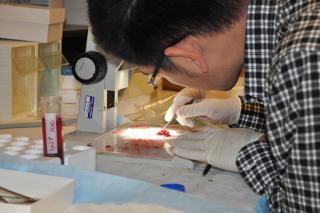
Surgical and Interventional Sciences, in conjunction with the McGill Faculty of Graduate Studies offers graduate level training program in Surgical and Interventional Sciences leading to a Master's or Ph.D. degree. The academic program is streamed to permit students to concentrate on either a clinical or basic research track.
Research in Surgery
Basic, clinical and evaluative research is conducted in all divisions of the McGill Department of Surgery. Areas of current interest include the cell biology of wound healing; biomechanics and bioengineering in orthopedics; tissue engineering of pancreatic islets and cardiac muscle; host defense in sepsis; tolerance and xenotransplantation; molecular biology of cancer; incontinence, impotence and infertility; health outcomes and technology assessment, including clinical trials; and technology R & D in minimally invasive surgery. Research activities within the Department are carried out across the McGill University Health Centre (MUHC) hospital network in surgical laboratories at the Montreal General Hospital, Montreal Children's Hospital, Royal Victoria Hospital, the Shriner's Hospital and the Sir Mortimer Davis-Jewish General Hospital.
Surgical and Interventional Sciences functions as the research arm of the McGill's Department of Surgery, coordinating research training in Surgery, representing the research interests of the McGill University Health Centre (MUHC) and at the Faculties of Medicine and Graduate Studies and Research. The most exciting, and potentially the most important undertaking of the program is the recent move to consider the establishment of concentration research programs in Surgery.

At present, under the direction Fackson Mwale, Ph.D., over 120 individuals actively participate in research programs, including faculty, clinical and post-doctoral fellows, graduate students, research assistants and technicians as well as visiting scientists and professors from different parts of the world. Most laboratories are structured along similar lines - full time basic scientists interacting with clinician -scientists. In this manner, movement of new discoveries from the bench to the bedside is facilitated and encouraged.
Projects are multidisciplinary in nature and offer both specialized and broad-based training through the use of the most recent techniques in molecular biology, biochemistry, pharmacology, physiology, pathology, bio-informatics and genomics.
The tradition of research in Surgery at McGill University is the oldest in Canada. Over the years, members of the Division have obtained international recognition through their highly productive and original research.
We are committed to creating the future of Surgery today. Increased emphasis will be placed on the need for innovation, which defined simply, is applied invention. Therefore, in addition to the quest for new knowledge, our traditional bench-to-bedside orientation is evolving towards discovery-based research that favours technology transfer.